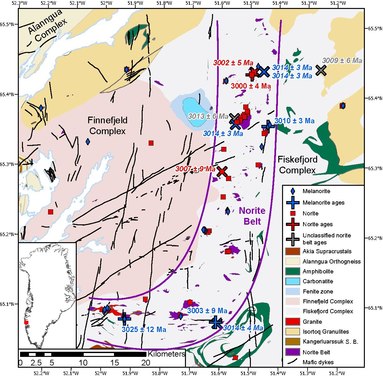Maniitsoq Norite Belt

The Maniitsoq Norite Belt is a ~75 km x 15 km J-shaped belt of igneous norite intrusions, located in the Akia Terrane of the North Atlantic Craton, Greenland, near the town of Maniitsoq.[1][2][3][4] The belt is found as enclaves ranging from meter-scale pods to 8 km2 large intrusive bodies within the ~3050 to 2990 Ma TTG and dioritic gneisses of the Akia terrane.[1][4] and formed contemporaneously with the host gneisses between ~3013 and 3001 Ma [1] The norites underwent high grade granulite facies metamorphism at temperatures of ~800 °C and pressures of ~9 kbar (approximately 30 km depth) from ~3010 to 2980 Ma, soon after they were intruded.[1][5] The norites were metamorphosed twice more at ~2.7 Ga and ~2.5 Ga.[6][7]
A wide variety of norite types are found within the belt, which can be broadly divided into two main groups with different mineral proportions and chemical compositions; plagioclase-rich 'norites' and pyroxene-rich 'melanorites'. These are believed to have formed from fractional crystallisation of a single type of magma, with accumulation of dense minerals such as pyroxene in the melanorites, and accumulation of less-dense minerals such plagioclase in the norites.[1] Their geochemical compositions indicate that they crystallised from a mafic magma, derived from partial melting of a depleted mantle source, which subsequently assimilated large amounts of continental crust. The Maniitsoq Norite Belt was interpreted to have formed in an ultra-hot orogeny due to the combination of norite formation from depleted mantle melting and crustal assimilation, TTG formation due to melting in the crust, and high temperature metamorphism that immediately followed magmatism.[1]
The Maniitsoq Norite Belt has long been investigated for its nickel-copper-cobalt-platinum group element mineral potential. The belt was first explored by Kryolitselskabet Øresund A/S from 1959 to 1973, and subsequently investigated by Falconbridge Ltd., Nunaoil A/S, Cominco Ltd., NunaMinerals A/S, and most recently by North American Nickel Inc.[4] Exploration was ongoing as of 2019 and planned until 2021.[8][9]
References
[edit]- ^ a b c d e f g Waterton, Pedro; Hyde, William R.; Tusch, Jonas; Hollis, Julie A.; Kirkland, Christopher L.; Kinney, Carson; Yakymchuk, Chris; Gardiner, Nicholas J.; Zakharov, David; Olierook, Hugo K. H.; Lightfoot, Peter C. (2020-09-22). "Geodynamic Implications of Synchronous Norite and TTG Formation in the 3 Ga Maniitsoq Norite Belt, West Greenland". Frontiers in Earth Science. 8: 562062. Bibcode:2020FrEaS...8..406W. doi:10.3389/feart.2020.562062. hdl:10023/20744. ISSN 2296-6463.
- ^ Secher (1983). "Noritic rocks and associated nickel-copper-sulphide occurrences in Sukkertoppen district, central West Greenland". The Geological Survey of Greenland Reports. 115: 30–34 – via GEUS.
- ^ Secher (2001). "The Pd + Pt dispersion in noritic and undifferentiated mafic rocks of the Archaean craton east of Maniitsoq, southern West Greenland". Danmarks og Grønlands Geologiske Undersøgelse Rapport. 123: 1–22 – via GEUS.
- ^ a b c Ravenelle, J. F., Weiershauser, L., and Cole, G. (2017). Report No.: 3CN024.004. Updated Independent Technical Report for the Maniitsoq Nickel-Copper-Cobalt-PGM Project, Greenland. Available at: https://s1.q4cdn.com/725069486/files/doc_downloads/technical_reports/Technical_Report_2017.pdf
- ^ Yakymchuk, C.; Kirkland, C.L.; Hollis, J.A.; Kendrick, J.; Gardiner, N.J.; Szilas, K. (2020). "Mesoarchean partial melting of mafic crust and tonalite production during high-T–low-P stagnant tectonism, Akia Terrane, West Greenland". Precambrian Research. 339: 105615. Bibcode:2020PreR..339j5615Y. doi:10.1016/j.precamres.2020.105615. hdl:10023/19439.
- ^ A. Steenfelt, J. Hollis, C. L. Kirkland, A. Sandrin, N. J. Gardiner, H. K. H. Olierook, K. Szilas, P. Waterton, C. Yakymchuk (2020-10-15). "The Mesoarchaean Akia terrane, West Greenland, revisited: New insights based on spatial integration of geophysics, field observation, geochemistry and geochronology". Precambrian Research. 352: 105958. doi:10.1016/j.precamres.2020.105958. hdl:10023/21175. ISSN 0301-9268.
{{cite journal}}: CS1 maint: multiple names: authors list (link) - ^ Kirkland, C.L.; Yakymchuk, C.; Hollis, J.; Heide-Jørgensen, H.; Danišík, M. (2018-09-01). "Mesoarchean exhumation of the Akia terrane and a common Neoarchean tectonothermal history for West Greenland". Precambrian Research. 314: 129–144. Bibcode:2018PreR..314..129K. doi:10.1016/j.precamres.2018.06.004. ISSN 0301-9268.
- ^ "Greenland Norite Belt Continues to Deliver with New Nickel Sulphide Discovery: 7.5m @ 1.26% Ni, 0.24% Cu and 0.47 g/t Pt+Pd+Au". www.northamericannickel.com. Retrieved 2020-11-06.
- ^ "North American Nickel Reports Update on Maniitsoq Project". www.northamericannickel.com. Retrieved 2020-11-06.
